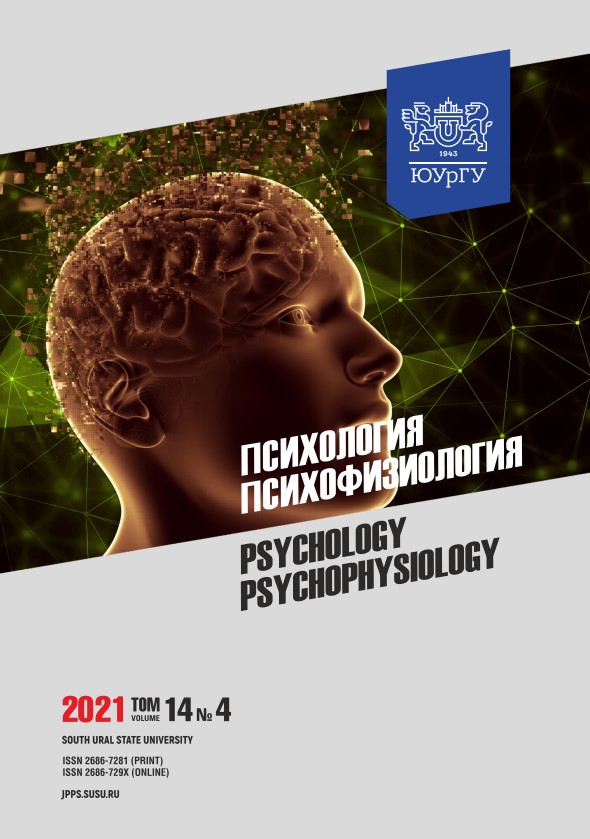RESILIENCE IN THE INTEGRAL INDIVIDUALITY OF STUDENTS
Abstract
Abstract. The scientific literature shows that a systematic analysis of resilience in the structure of human individuality has not been a topic of special research. Therefore, this article aims to describe the structure of resilience and to find its relationships with multilevel features of individuality. Materials and methods. The following methods were used for the purpose of the study: E. Rylskaya Human Resilience Test, J. Strelau Questionnaire, G. Eysenck Personality Inventory, V. Rusalov Formal-Dynamic Personality Inventory, Cattell Sixteen Personality Factor Questionnaire, Freiburg Personality Inventory, T. Leary Interpersonal Checklist, Rokeach Value Survey, Locus of Control Scale. The data obtained were processed with parametric methods (Student's t-criterion, Pearson correlation analysis) using the SPSS 20.0 statistical software package. Results: A correlation was found between resilience and such properties of the nervous system as the strength of excitation and mobility. The inverse relationship was observed between resilience and neuroticism, and a direct one between resilience and communicative ergicity. At the personality level, the closest positive correlations were recorded between resilience and sociability/courage, while the negative ones were found for neuroticism, depressiveness, and emotional lability. At the value level, resilience and its components were associated with both core values/goals (active life, financial independence, friends, social recognition, knowledge, freedom of expression, ability to be happy for someone, adequate self-esteem) and values/means (optimism, diligence, intelligence, self-control, honesty). At the socio-psychological level, resilience was associated with internality in terms of failures and achievements, production and interpersonal relations.
Conclusion: Resilience can be considered as integration of personal characteristics, therefore, the main role in its formation belongs to personal and social-psychological levels. The data obtained for students partially confirm the results of adult respondents and demonstrate the unitarity of personal and communicative components as the most important determinants of resilience.
Downloads
References
2. Scrivner C., Johnson J., Kjeldgaard-Christiansen J., Clasen М. Pandemic Practice: Horror Fans and Morbidly Curious Individuals Are More Psychologically Resilient During the COVID-19 Pandemic. PsyArXiv Preprints. 2020. DOI: 10.31234/osf.io/4c7af .
3. Tang S., Xiang M., Cheung T., Xiang Y.T. Mental health and its correlates among children and adolescents during COVID-19 school closure: The importance of parent-child discussion. Journal of Affective Disorders. 2021;279:353-360. DOI: 10.1016/j.jad.2020.10.016.
4. Vagni M, Maiorano T, Giostra V, Pajardi D. Hardiness and Coping Strategies as Mediators of Stress and Secondary Trauma in Emergency Workers during the COVID–19 Pandemic. Sustainability. 2020;12(18):7561. DOI: 10.3390/su12187561
5. Chistyakova N.V., Frolova P.S. [Subjective behavior control as coping resource in COVID-19]. Mezhdunarodnyi zhurnal eksperimentalnogo obrazovaniya = International Journal of Experimental Education. 2020;3:53–57. (in Russ.). DOI: 10.17513/mjeo.11965
6. Mnogosmyslova A.A. [The relationship between viability and internet addiction disorder
of a person]. Yaroslavskii pedagogicheskii vestnik = Yaroslavl Pedagogical Bulletin. 2020;3(114):117–124. (in Russ.). DOI: 10.20323/1813-145X-2020-3-114-117-124
7. Pogorelov D.N. [Structure of virtual identity of users of social networks] Kazanskij pedagogicheskij zhurnal = Kazan Pedagogical Journal. 2020;4 (141):262–267. (in Russ.).
8. Plyushcheva O.A., Makhnach A.V. [Resilience of a specialist in a helping profession in an organizational environment]. Organizacionnaya psihologiya = Organizational psychology. 2021;11(2):124–153. (in Russ.).
9. Mahnach A.V. [World-view direction as a component of resilience in socionomic professions]. Institut psikhologii Rossiiskoi akademii nauk. Organizatsionnaya psikhologiya i psikhologiya truda = Institute of psychology Russian Academy of Sciences. Organizational Psychology and Labor Psychology. 2018;3(1):62–91. URL: http://work-org-psychology.ru/engine/documents/document322.pdf
(acceded: 21.07.2021). (in Russ.).
10. Lotareva T.Yu. [The role of social support to resilience of social sphere professionals]. Psihologicheskij zhurnal = Psychological Journal. 2017;38(1):64–72. (in Russ.).
11. Kotovskaya S.V. [Biopsychosocial factors of optimal resilience in extreme conditions]. Psihologiya. Psihofiziologiya = Psychology. Psychophysiology. 2021;14(1):23–30. (in Russ.). DOI: 10.14529/jpps210103.
12. Postylyakova Yu.V. [Individual and academic resilience of students]. Socialnye i gumanitarnye nauki na Dalnem Vostoke = The Humanities And Social Studies in the Far East. 2018;15(4):147–152. (in Russ.). DOI: 10.31079/1992-2868-2018-15-4-147-152
13. Postylyakova Yu.V. [Ecological model of thr students resilience]. Institut psikhologii Rossiiskoi akademii nauk. Organizatsionnaya psikhologiya i psikhologiya truda = Institute of psychology Russian Academy of Sciences. Organizational Psychology and Labor Psychology. 2020;5(4):218–239. (in Russ.). DOI: 10.38098/ipran.opwp.2020.17.4.009.
14. Ananyev B.G. Chelovek kak predmet poznaniya [Man as an object of knowledge]. St. Petersburg: Peter Publ. 2001:288. (in Russ.).
15. Merlin V.S. Sistemnyi podkhod k ontogenezu integralnoi individualnosti [A systematic approach to the ontogenesis of integral individuality]. Psikhologiya formirovaniya i razvitiya lichnosti [Psychology of personality formation and development]. Ed. L.I. Antsyferova. Moscow: Nauka Publ. 1981:87–105. (in Russ.).
16. Vyatkin B.A., Dorfman L.Ya. [Theory of integral individuality by V.S. Merlin: history and nowadays]. Obrazovanie i nauka = Education and science. 2017;19(2):145–160. (in Russ.). DOI: 10.17853/1994-5639-2017-2-145-160
17. Vyatkin B.A., Shchukin M.R. [History and methodology of the study of human styles in the school of V.S. Merlin (to the 120th anniversary of the scientists birth)]. Metodologiya i istoriya psihologii = Methodology and history of psychology. 2018;3:127–150. (in Russ.). DOI: 10.7868/S1819265318030081
18. Tarasova E.V. [The structure of the viability of a psychotherapist]. Klinicheskaya i meditsinskaya psikhologiya: issledovaniya, obuchenie, praktika = Clinical and medical psychology: research, training, practice. 2016;2(12):7
19. Laktionova A.I. [Dependence of Human Resilience on the Features of Temperament and Control of Behavior]. Psihologiya. Psihofiziologiya = Psychology. Psychophysiology. 2019;12(4):24–33. (in Russ.). DOI: 10.14529/jpps190403.
20. Naumenko Yu.V. [Socio-cultural phenomena “health” and “healthy lifestyle”: the essence and strategy of formation]. Problemy sovremennogo obrazovaniya = Problems of modern education. 2012;6:151–176.
21. Elliot A.J., Thrash T.M. Achievement goals and the hierarchical model of achievement motivation. Educational Psychology Review. 2001;13(2):139–156. DOI: 10.1037 / 0022-3514.82.5.804
22. Kirillova N.A. [Value orientations in the structure of integral individuality of senior schoolchildren]. Voprosy psihologii = Questions of psychology. 2010;(4):29–37.
23. Martynenko O.V., Kiseleva A.A. [Features of the relationship of value orientations and psychodynamic properties in the structure of integral individuality of schoolchildren and students]. Psihologiya i pedagogika: metodika i problemy prakticheskogo primeneniya. Psychology and pedagogy: methodology and problems of practical application. 2013;30:17–23.
References on translit
-Copyright (c) 2021 Psychology. Psychophysiology

This work is licensed under a Creative Commons Attribution-NonCommercial-NoDerivatives 4.0 International License.



